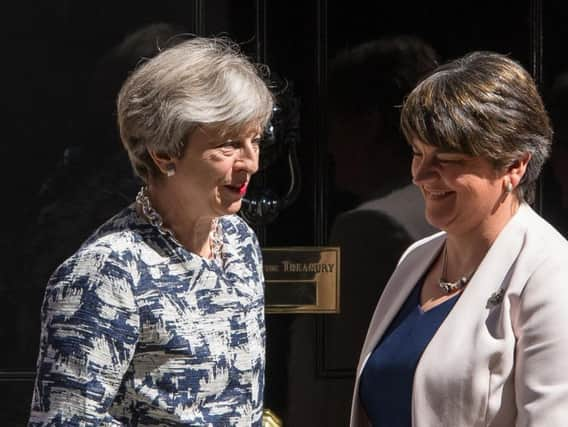PM defends £1Bn DUP deal amid Labour claims it will 'increase division'


The deal announced on Monday was branded a "bung" after it emerged the Prime Minister had approved an additional £1 billion in spending on infrastructure and health in Northern Ireland, along with new flexibility over £500 million of previously allocated cash, as part of an arrangement which will see the DUP's 10 MPs prop up her minority administration.
Scottish and Welsh politicians have demanded equivalent sums are handed over under the so-called Barnett formula, which normally guarantees proportional rises in the different nations of the UK.
Advertisement
Hide AdAdvertisement
Hide AdLabour has now released figures from the House of Commons Library suggesting that if the formula was applied to the funding announced on Monday, it could see as much as £68 billion spent in the rest of the UK.
Shadow chancellor John McDonnell said the deal could eventually be worth as much as £2 billion, which would normally imply £59 billion of additional spending in England, £6 billion in Scotland and £3 billion in Wales, under the system known as "Barnett consequentials".
But senior Conservative sources have insisted the Barnett formula does not apply to the money because it is an addition to the Northern Ireland Executive's block grant. They pointed out that similar exemptions affected cash for city deals in Scotland and Wales.
Speaking during a visit to Bristol, Mrs May said: "We've seen across Scotland, Wales and England Government investing in those parts of the country.
Advertisement
Hide AdAdvertisement
Hide Ad"If you look at Scotland we've seen city deals, we've seen the same in the south west of England with the Bristol city deal, we've seen the local growth deal.
"The Government recognises the importance of investing in all parts of the country.
"That's what I want to ensure - a country that works for everyone and ensuring that we are seeing growth and prosperity spread across the whole country."
Mr McDonnell said: "The coalition of chaos that was set up yesterday risks increasing division in our society by easing austerity in one part of the UK alone.
Advertisement
Hide AdAdvertisement
Hide Ad"We need to see an end to austerity throughout the UK, not just in Northern Ireland, and not just to prop up Theresa May and her failed Government.
"Labour's fully costed alternative programme of government stands ready to provide Britain with the leadership that will truly end austerity, and unite all nations and regions in our country."
Under the "confidence and supply" deal signed in 10 Downing Street after negotiations stretching 18 days after the June 8 General Election, the DUP guaranteed its 10 MPs will vote with the Government on the Queen's Speech, the Budget, and legislation relating to Brexit and national security.
Together with the 317 Tory MPs remaining after Mrs May's disastrous decision to call a snap election, this will allow the Prime Minister to pass the 326 figure required for an absolute majority in the House of Commons, ensuring her victory in key divisions and protecting her Government from collapse.
The DUP's support in votes which are not covered by the arrangements will be agreed "on a case-by-case basis".